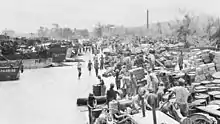20th Marine Regiment (United States)
20th Marine Regiment was an Composite Engineer Regiment of the United States Marine Corps that fought during World War II.[1]
| 20th Marine Regiment | |
|---|---|
| Active | June 15, 1943 — August 31, 1944 |
| Country | |
| Branch | |
| Type | Engineer regiment |
| Engagements | World War II |



Subordinate units
The regiment was a composite of three different types of battalions[2] and a headquarters and service company:
- Headquarters & Services Company
- 1st Battalion, A, B,& C Companies 4th Engineer Battalion
- 2nd Battalion, D, E, & F Companies 4th Pioneer Battalion
- 3rd Battalion, G, H, & I Companies 121st Naval Construction Battalion[3]
History
20th Marines was formed on June 15, 1943,[1] at Marine Corps Base Camp Lejeune, North Carolina, it originally consisted of three battalions and was assigned to support the 4th Marine Division. The 1st and 2nd Battalions were made up of the 4th Marine Engineers and Pioneers while the 3rd Battalion was formed with US Navy Construction Battalion personnel also known as Seabees.[4] During the war the Regiment involved in the battle of Roi Namur, Battle of Saipan and Battle of Tinian. On Saipan, the 4th Marine Division assigned 2/20 and 3/20 (4th Pioneers and 121st CB) as the shore party[5] The regiment was inactivated on August 31, 1944 with the 4th Engineer and 4th Pioneer Battalions reassigned to the Division itself. While the 121st NCB remained at Tinian to work on the airfield, the 4th moved on preparing for Iwo Jima. 133 NCB was posted to the slot vacated by the 121st. With the 20th Regiment gone the 133rd was assigned to the 23rd Marines as their shore party and the 4th Pioneers were assigned to the 25th Marines as theirs. The 4th Engineers were then under divisional control. A note concerning the 121st. That Battalion had Marine Officers assigned to it.[6]
When the 19th CB was assigned to the Marine Corps 11/05/42 it lost one company and 1/4 of Hq Co.[7] Those men were assigned to the Fleet Marine Force Replacement Group, New River, NC (19th replacement group) which would form the core of the 121st CB when it was formed 05/03/43.[8] On 7 July 43 the Battalion was redesignated as the Third Battalion Twentieth Marines. The Battalion was shore party for the 23rd Combat team on beaches blue 1 and 2 on Saipan.[8]
On Tinian there were two small beaches on the North end where an assault landing could be made.[9] The rest of the island had coral cliffs up to 15 feet in height at the waters edge negating any assault plans. However, the Marine Corps asked the Seabees if they could come up with an idea to facilitate a landing in one of these other areas. Commodore Paul J. Halloran (CEC) CB theater commander provided drawings of a conceptual landing ramp for the 18th and 121st CBs to fabricate.[9] They mounted steel beams salvaged from Saipans abandoned sugar mill on LVT-2s to create a portable assault ramps. If they worked they would allow the Marines to outflank Tinian's prepared defenses. The Marine General was skeptical and ordered that the ramps be put through a 100 vehicle use tests. The Seabee creation was named a Doodlebug.[9] It worked exactly as the Marines had hoped.[9]
Regiment's Commanders
- Lieutenant Colonel Nelson K. Brown (15 June 1943 - 22 August 1943)
- Colonel Lucian W. Burnham (23 August 1943 - 9 April 1944)
- Lieutenant Colonel Nelson K. Brown (10 April 1944 - 31 August 1944)
Unit awards
See also
Further reading
- Rottman, Gordon L. (2002). U.S. Marine Corps World War II Order of Battle - Ground and Air Units in the Pacific War, 1939 - 1945. Greenwood Press. ISBN 0-313-31906-5.
References
- U.S. Marine Corps World War II Order of Battle Fleet Marine Force Ground Units, Rottman p. 220
- Battle Orders - US Marine Corps Pacific Theater of Operations 1943-44, Gordon L Rottman, Osprey Publishing, p. 13
- US Marine Corps World War II order of battle : ground and air units in the Pacific War, 1939-1945|date=2002, Gordon L. Rottmann, Greenwood Press, Westport, Connecticut, p. 218-220
- 121st NCB
- U.S. Army in World War II, Campaign in the Marianas, Chapter VII, Philip A. Crowel, U.S.Army, 1959. p. 125
- Seabees with the Marines, U.S. Navy Seabee Museum Archives, Port Hueneme, CA 93043
- 19th Naval Construction Battalion Historical Information, Seabee Museum website
- 121st Naval Construction Battalion Historical Information, Seabee Museum website
- The Doodlebug, Naval History and Heritage Command, U.S. Navy Seabee Museum webpage, Port Hueneme, Ca,